Designing a Future Society for Our Lifes
IEEE NPSS Climate Change Initiative Hosts Groundbreaking Symposium at the Osaka World Expo

As part of its mission to align nuclear and plasma sciences with solutions to natural and extreme weather events, the IEEE Nuclear and Plasma Sciences Society Climate Change Initiative (NPSSCCI), together with the IEEE Energy and Sustainable Technology (ESTEK) inter-societal group, and the University of Osaka convened a high-impact symposium to address the disproportionate effects of natural and climate-related disasters on underrepresented groups and women.
Held during the World Expo in Osaka on August 4-5, 2025 at the Netherlands Pavilion “Common Ground,” with 30 in person and 50 online attendees, the event brought together a global, interdisciplinary group to develop technological and community-centered solutions to one of the most pressing challenges of our time: the catastrophic effects of natural and climate-related weather events on the world population. The program featured presentations from IEEE societies, technical communities, international NGOs active in disaster risk reduction and gender equity, academic experts, and a government minister.
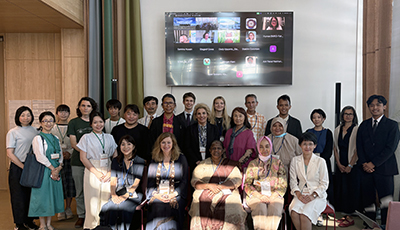
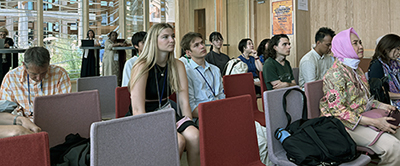

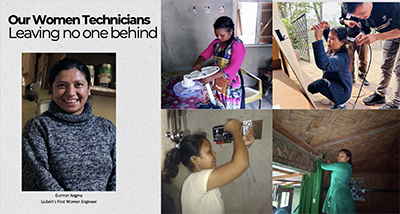
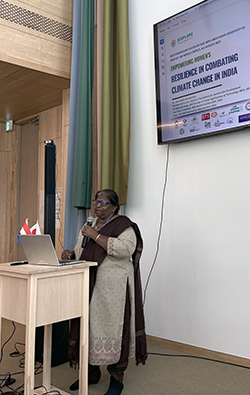
Over two days, scientists together with climate and technology experts examined how disasters such as tsunamis, floods, wildfires, cyclones, droughts, and sea-level rise, disproportionately impact women and marginalized communities, highlighting the lack of early warning infrastructure in remote regions and the need for inclusive planning in disaster mitigation. Case studies ranged from the impact of Himalayan glacier melt on mountain villages (Dr Paras Loomba) where the devastating 2013 Kedarnath floods resulted in over 5,700 deaths and £12 billion in economic losses and the involvement of women engineers in mitigating the devastating extreme weather effects to lessons learned from preparedness strategies following the 2011 Fukushima earthquake both involving the tsunami and the accident of the Daiichi nuclear power plant (Prof Megumi Sugimoto and Prof. Masaharu Nomachi). Discussions also explored the potential of artificial intelligence for identifying early warning signs and developing educational tools to enhance disaster readiness (Prof. Mei Lin Fung and Prof. Morgan Kiani). Prof. Ramalatha Marimuthu addressed the challenges faced by women in India who leave STEM careers due to family obligations, emphasizing the importance of re-entry pathways. Examples from various regions demonstrated how women are already leading local initiatives in energy harvesting, clean cooking technology, water sanitation, and smart sustainable agriculture. Professors Bozenna Pasik-Duncan and Professor Maike Luiken delivered inspirational presentations on the World Bank’s support for women-led energy projects, the role of stochastic systems in mitigating randomness in data interpretation, the importance of ethics in science and how IEEE plans to play a major role in reducing carbon emission (https://sagroups.ieee.org/planetpositive2030/). Finally, Prof. Takako Hashimoto, IEEE Region 10 Director, summarised the effort the largest IEEE region is making in the field of “survival informatics”.
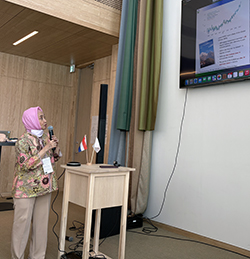
A major highlight was the keynote by Professor Dwikorita Karnawati, Director of the Indonesian Agency for Meteorology, Climatology and Geophysics (BMKG) and Permanent Representative of Indonesia to the World Meteorological Organization (WMO), who underscored the escalating frequency and severity of climate-related disasters in Indonesia, particularly in coastal and island regions, and stressed that “preparedness is a necessity, not a luxury”, calling for localized, technologically robust, community-integrated, and trusted tsunami early warning systems.
A special session featured six undergraduate students from four countries, selected from nearly 20 applicants, who presented innovative technical solutions for disaster resilience, in some cases through direct experience, reflecting both strong technical skills and deep commitment to the safety of the most vulnerable communities.
Building on Professor Karnawati’s call to action, IEEE NPSSCCI and partners announced a major initiative to install a tsunami detection and alert system in a remote Indonesian coastal region, integrating seabed pressure recorders, surface buoys, satellite telemetry, and photovoltaic-powered storage to ensure uninterrupted operation, with local women’s cooperatives leading outreach and maintenance to enhance sustainability and trust. Samina Husain, President of the IEEE Broadcast Technology Society (BTS), concluded by stressing that climate-induced disasters continue to be a global challenge and we have the opportunity to rethink how technology can drive resilience and inclusivity. IEEE BTS remains committed to being a partner in disasters management with a focus on resilient communication.

The symposium concluded with a commitment to reconvene at the NPSSCCI “Workshop on Sustainable Entrepreneurship in Developing Countries” in October 2026 in Geneva, Switzerland, hosted by the CERN IdeaSquare focusing on climate-resilient livelihoods, technological innovation, environment focused solutions and young professionals’ leadership.
For more information on NPSSCCI, participation opportunities, and upcoming events, visit ieee-npss.org/climate-change-initiative. The link to the Osaka Symposium can be found here: https://indico.rcnp.osaka-u.ac.jp/event/2569/
Cinzia DaVià, NPSSCCI Lead, ESTEK Chair, Osaka Symposium Chair can be reached at [email protected]